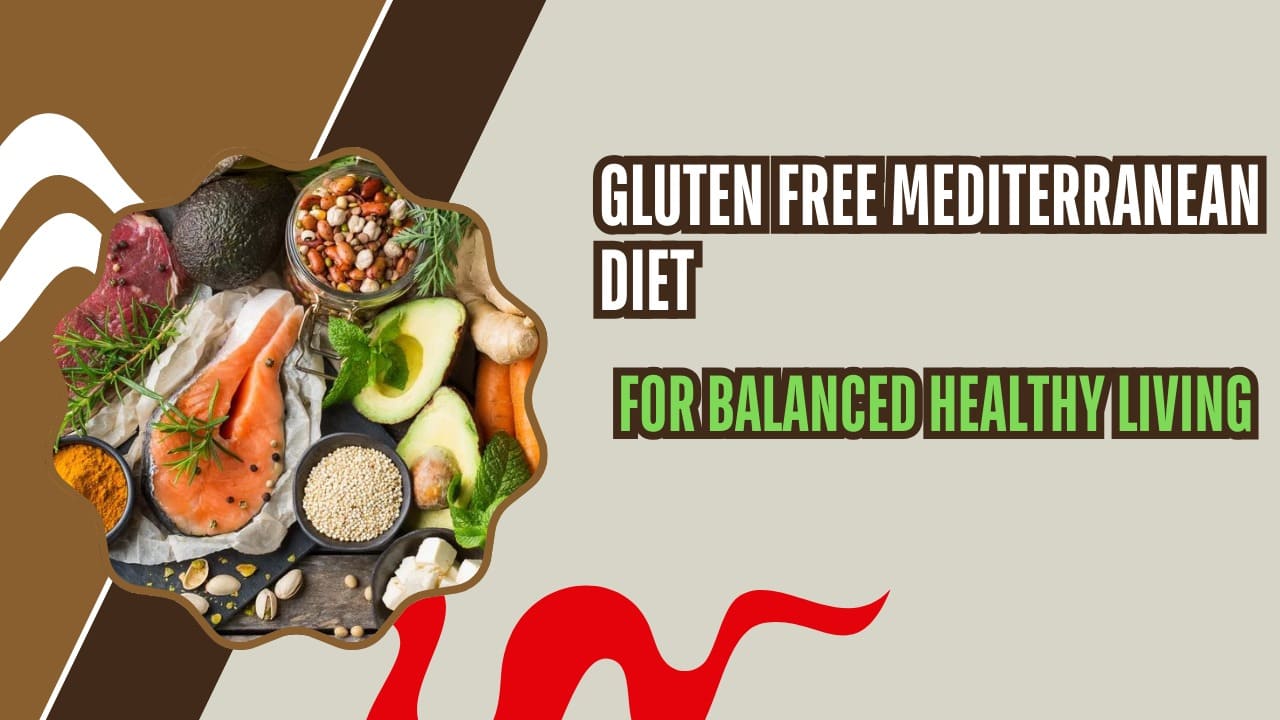The gluten free Mediterranean diet is a powerhouse of nutrition, combining the anti-inflammatory benefits of the Mediterranean way of eating with the digestive-friendly nature of a gluten-free lifestyle. It’s more than a fad—it’s a well-balanced, research-backed approach that supports heart health, gut wellness, and sustainable living.
Formed from centuries-old eating habits of countries bordering the Mediterranean Sea (like Greece, Italy, and southern Spain), this diet celebrates whole foods like olive oil, legumes, fresh fruits, vegetables, and lean proteins. By eliminating gluten, it becomes a suitable solution for those with celiac disease, gluten sensitivity, or those aiming for a less inflammatory diet.
In this guide, we’ll dive deep into what the gluten free Mediterranean diet is, why it’s gaining popularity, when to start, and how to transition effectively. Plus, we’ll share 8 powerful tips, each with benefits and food ideas, and answer top 5 FAQs to help you fully embrace this lifestyle.
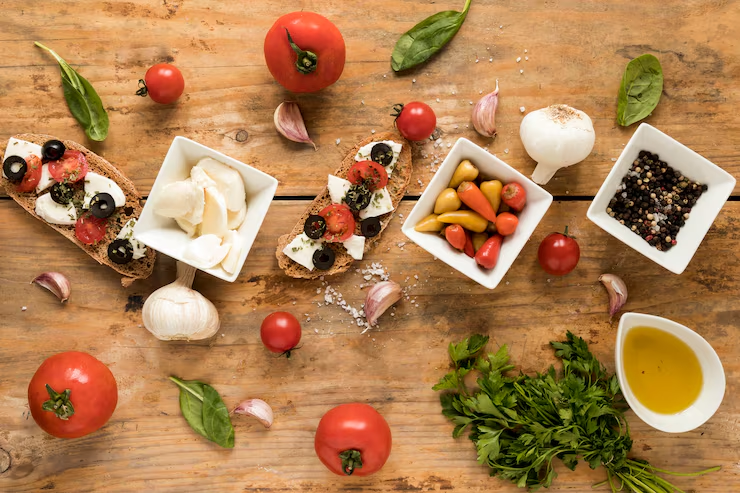
What is the Gluten Free Mediterranean Diet ?
The gluten free Mediterranean diet is a fusion of two powerful eating styles: the traditional Mediterranean diet and a gluten-free lifestyle. It emphasizes whole, unprocessed foods such as fruits, vegetables, lean proteins, healthy fats, and naturally gluten-free grains while avoiding gluten-containing ingredients like wheat, barley, and rye.
This dietary approach supports overall wellness by reducing inflammation, supporting gut health, and improving heart function. By focusing on gluten-free alternatives such as quinoa, brown rice, and legumes, the diet still delivers the fiber and nutrients found in traditional Mediterranean staples. It’s especially beneficial for individuals with celiac disease or gluten sensitivity.
Following the gluten free Mediterranean diet encourages mindful eating and balanced meals. It includes healthy fats from olive oil, antioxidants from fresh produce, and lean proteins from fish and legumes. This diet is not only safe for gluten-free individuals but also promotes longevity and overall health through clean, nourishing foods.
At its core, the gluten free Mediterranean diet merges two concepts:
Mediterranean Diet: A plant-forward, heart-healthy dietary pattern inspired by the traditional eating habits of Mediterranean cultures. It emphasizes:
Olive oil as the main fat
Daily servings of vegetables and fruits
Legumes and nuts
Whole grains (traditionally)
Lean proteins (especially fish)
Limited red meat and sweets
Gluten-Free Diet: A dietary practice that excludes all foods containing gluten, a protein found in wheat, barley, and rye. People with celiac disease or non-celiac gluten sensitivity must follow this to avoid inflammation, nutrient malabsorption, and digestive issues.
When these are combined, you eliminate traditional gluten-containing grains (like bulgur, semolina pasta, or regular bread) and replace them with gluten-free grains and whole foods—without sacrificing taste or nutrition.
Why Follow a Gluten Free Mediterranean Diet ?
✅ Health Reasons: Celiac Disease or Gluten Sensitivity: Prevents autoimmune damage and symptoms like bloating, fatigue, and joint pain.
Anti-inflammatory benefits: The Mediterranean diet is naturally rich in omega-3s, fiber, and antioxidants.
Heart Health: Studies consistently show reduced risk of heart disease.
Weight Management: High in fiber and low in processed foods.
Improved Gut Health: Supports a balanced gut microbiome without triggering inflammation.
🌍 Sustainability & Lifestyle
Focuses on whole, seasonal foods
Encourages mindful eating
Reduces processed food dependency
When is the Right Time to Start ?
There’s no wrong time to begin. But here are the best moments to consider switching:
After diagnosis of gluten intolerance or celiac disease
During a lifestyle overhaul (e.g., beginning of a new year)
If you’re recovering from chronic gut issues
Post-pregnancy or after major life stressors to restore balance
The Mediterranean diet is safe for long-term use and is adaptable for all ages.
How to Follow a Gluten Free Mediterranean Diet
To follow a gluten free Mediterranean diet, begin by focusing on whole, naturally gluten-free foods. Prioritize fresh vegetables, fruits, legumes, nuts, and seeds. Choose lean proteins like fish, poultry, and eggs, and use olive oil as your primary cooking fat. These staples form the foundation of both Mediterranean and gluten-free eating.
Avoid common gluten-containing grains like wheat, barley, and rye. Instead, opt for safe alternatives such as quinoa, brown rice, millet, buckwheat, and certified gluten-free oats. When shopping, read food labels carefully to avoid hidden sources of gluten, especially in sauces, seasonings, and processed items.
Consistency is key. A gluten free Mediterranean diet works best when meals are home-cooked and rich in anti-inflammatory ingredients. Snack on olives or roasted chickpeas, enjoy grilled vegetables with hummus, and finish meals with a piece of fruit or a handful of nuts. This balanced approach supports digestive health, boosts energy, and promotes long-term wellness.
Key Principles:
Choose gluten-free whole grains: Quinoa, brown rice, millet, amaranth, polenta, certified gluten-free oats.
Opt for fresh fruits & vegetables: At least 5 servings a day.
Use olive oil as your primary fat.
Eat legumes and nuts regularly.
Consume fish and seafood at least twice a week.
Limit red meats and processed foods.
Avoid all gluten-containing foods: Breads, pasta, and sauces unless labeled gluten-free.
Stay hydrated and enjoy meals with others, Mediterranean-style.
🧠 Long-Term Benefits of the Gluten Free Mediterranean Diet
Reduced Inflammation – Key for managing chronic diseases
Better Gut Health – No gluten triggers, and plenty of prebiotic fiber
Improved Heart Health – Thanks to olive oil, fish, and nuts
Sustainable Weight Management – Whole foods = satiety
Longevity & Brain Protection – Linked to reduced Alzheimer’s risk
👥 Eating Out & Socializing Tips
One challenge of any special diet is eating out or attending events. Here’s how to navigate that:
Research Restaurants First: Look up menus online. Mediterranean restaurants are often gluten-friendly by nature.
Communicate Clearly: Tell your server you need a gluten-free meal and ask about cross-contamination.
Bring a Dish: If attending a potluck or party, bring a gluten-free Mediterranean dish you can safely enjoy.
Choose Naturally Gluten-Free Foods: Go for grilled proteins, salads, rice, vegetables—skip bread, sauces unless labeled gluten-free.
🌟 Top Tips for an Effective Gluten Free Mediterranean Diet
Stock Up on Naturally Gluten-Free Whole Grains
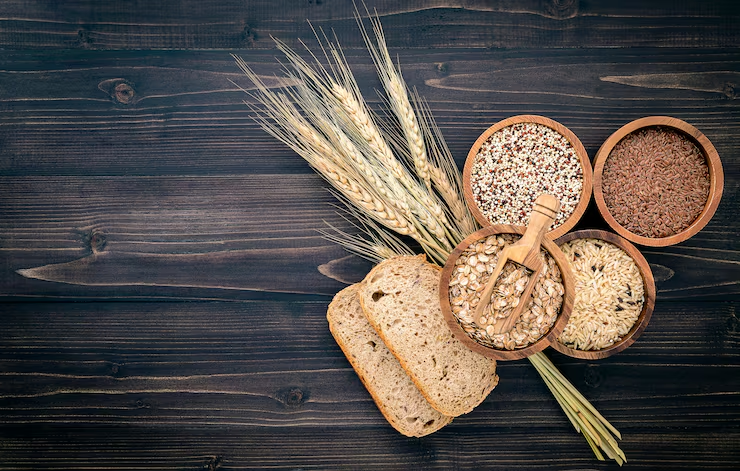
Whole grains are a cornerstone of the gluten free Mediterranean diet, offering essential nutrients, fiber, and sustained energy. While traditional Mediterranean staples like bulgur and farro contain gluten, there are plenty of naturally gluten-free alternatives to choose from.
Options like quinoa, brown rice, millet, and certified gluten-free oats can easily be incorporated into meals. Quinoa makes a great base for tabbouleh, while brown rice pairs well with grilled fish and vegetables. These grains not only mimic the texture of traditional ones but also deliver key vitamins and minerals that support heart health and digestion.
Choosing naturally gluten-free whole grains ensures you’re staying true to the principles of the Mediterranean lifestyle while avoiding gluten-related inflammation or sensitivities. By planning your pantry wisely, you can enjoy the full benefits of the gluten free Mediterranean diet without compromising on flavor, nutrition, or satisfaction at the table.
Benefits: Boosts fiber, provides energy, keeps you full longer.
Best Ingredients:
Quinoa
Brown rice
Polenta (cornmeal)
Buckwheat
Gluten-free oats
➡️ Tip: Batch-cook quinoa or rice and keep it in the fridge to make quick bowls with veggies and proteins.
Prioritize Fresh, Seasonal Vegetables and Fruits
One of the core principles of the gluten free Mediterranean diet is filling your plate with fresh, seasonal vegetables and fruits. These foods are rich in fiber, antioxidants, and essential nutrients that support digestion, immunity, and overall vitality.
Seasonal produce not only tastes better but also contains higher nutrient levels. Think ripe tomatoes in summer, dark leafy greens in winter, and sweet citrus in spring. Including a rainbow of colors in your meals ensures a wide variety of phytonutrients, which contribute to better gut health and reduced inflammation—both vital for anyone on a gluten free Mediterranean diet.
Avoid relying on packaged or canned alternatives that may contain added sugars or preservatives. Instead, shop local and focus on quality over quantity. Whether roasted, raw, or blended into smoothies, fresh produce plays a starring role in the gluten free Mediterranean diet, keeping your meals vibrant, wholesome, and naturally gluten-free.
Benefits: Reduces inflammation, strengthens immunity, supports digestion.
Best Ingredients:
Tomatoes, cucumbers, leafy greens, bell peppers
Zucchini, eggplant, carrots
Berries, oranges, grapes, figs
➡️ Tip: Aim for a colorful plate. Each color represents different antioxidants.
Olive oil
A cornerstone of the gluten free Mediterranean diet is the generous use of olive oil as the primary source of fat. Rich in monounsaturated fats and powerful antioxidants, extra virgin olive oil supports heart health, reduces inflammation, and contributes to radiant skin and hair.
Incorporating olive oil into your daily meals is easy and delicious. Drizzle it over fresh salads, roasted vegetables, or use it as a base for marinades and dressings. Unlike processed oils, olive oil adds depth of flavor and essential nutrients, enhancing both taste and health benefits within your gluten free Mediterranean diet.
Replacing butter or margarine with olive oil is a smart, wholesome switch. It’s especially important in gluten-free cooking, where whole, natural ingredients are key. By making olive oil your go-to fat, you’re embracing the essence of the gluten free Mediterranean diet—clean eating that nurtures the body and delights the senses.
Benefits: Protects the heart, supports brain health, reduces bad cholesterol.
Best Uses:
Salad dressings
Roasting vegetables
Light sautéing
➡️ Tip: Choose extra virgin olive oil (EVOO) for maximum polyphenol content.
Enjoy Fish Twice a Week

In a well-balanced gluten free Mediterranean diet, fish plays a central role. Rich in omega-3 fatty acids, lean protein, and essential nutrients like vitamin D and selenium, fish helps support heart health, brain function, and overall wellness. Fatty fish like salmon, sardines, and mackerel are especially beneficial.
Aim to enjoy fish at least twice a week as part of your gluten free Mediterranean diet. Grilled salmon with olive oil and lemon, baked sardines with herbs, or tuna over a fresh veggie salad are easy and delicious options. These meals not only satisfy the palate but also contribute to anti-inflammatory benefits.
Choosing fish over red or processed meat aligns with the core principles of the gluten free Mediterranean diet. It’s a heart-smart substitution that also enhances variety and flavor in your weekly meal planning. Pair your fish with gluten-free whole grains and vegetables for a truly nourishing combination.
Benefits: Omega-3s reduce inflammation and boost cognitive health.
Best Fish:
Salmon
Sardines
Mackerel
Trout
➡️ Tip: Bake fish with herbs, lemon, and olive oil for a quick meal.
Incorporate Legumes and Pulses
Incorporating legumes and pulses is an essential part of a balanced gluten free Mediterranean diet. Foods like lentils, chickpeas, black beans, and peas are naturally gluten-free and provide plant-based protein, fiber, iron, and B vitamins. These nutrients support heart health, stabilize blood sugar, and promote sustained energy.
Adding legumes to your meals is simple and delicious. Try hummus made from chickpeas as a dip, lentil soup for a hearty lunch, or a bean salad tossed with olive oil and herbs. These ingredients complement the fresh vegetables, olive oil, and lean proteins that define the Mediterranean way of eating.
For those following a gluten free Mediterranean diet, legumes offer a satisfying and nourishing alternative to gluten-based grains. They not only enhance the variety of your meals but also help maintain a healthy gut and reduce inflammation—key goals of this wholesome lifestyle approach.
Benefits: High in fiber and plant-based protein; supports blood sugar control.
Best Ingredients:
Lentils
Chickpeas
Black beans
White beans
➡️ Tip: Make hummus or lentil salad for quick snacks or lunch options.
Snack on Nuts and Seeds
Snacking on nuts and seeds is a smart and satisfying choice when following a gluten free Mediterranean diet. These small powerhouses are loaded with healthy fats, protein, and essential vitamins like vitamin E, magnesium, and zinc—all of which support brain, heart, and skin health.
Almonds, walnuts, pistachios, and sunflower seeds are excellent gluten-free snack options that align with the Mediterranean eating pattern. They help stabilize blood sugar levels, reduce inflammation, and curb hunger between meals. Just be sure to choose unsalted and unprocessed varieties to get the full health benefits.
Incorporating nuts and seeds into your gluten free Mediterranean diet can also enhance meal variety and flavor. Sprinkle them on salads, blend into smoothies, or pair with fresh fruit for a nourishing mini-meal. Not only do they add crunch and satisfaction, but they also support long-term wellness with their nutrient-rich profiles.
Benefits: Provides healthy fats, protein, and minerals.
Best Choices:
Almonds
Walnuts
Pumpkin seeds
Sunflower seeds
➡️ Tip: Combine with dried fruit for a Mediterranean-style trail mix.
Choose Gluten-Free Alternatives Wisely
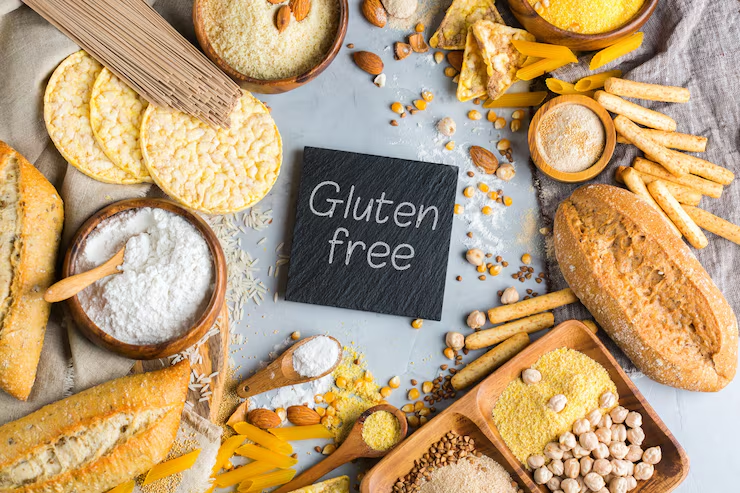
When following a gluten free Mediterranean diet, it’s essential to be mindful about the gluten-free products you choose. Many packaged gluten-free foods are highly processed and may contain excess sugar, unhealthy fats, or additives that can negate the benefits of the Mediterranean lifestyle.
Rather than relying on store-bought gluten-free bread or pasta, opt for naturally gluten-free whole grains like quinoa, brown rice, millet, or buckwheat. These alternatives are rich in fiber and nutrients, and they complement the heart-healthy components of the Mediterranean diet such as olive oil, fresh vegetables, legumes, nuts, and fish.
The gluten free Mediterranean diet emphasizes quality over convenience. By choosing wholesome, unprocessed foods, you not only support better digestion but also maintain steady energy levels and support long-term wellness. With a little planning and creativity, you can enjoy meals that are both nourishing and flavorful while staying gluten-free.
Benefits: Prevents accidental gluten exposure, especially in packaged foods.
Smart Substitutes:
Gluten-free pasta (made with lentils, quinoa, or brown rice)
Gluten-free bread (preferably made from almond or coconut flour)
Gluten-free crackers (made from flax, chia, or seeds)
➡️ Tip: Always check for “certified gluten-free” labels to avoid cross-contamination.
Embrace Herbs, Spices, and Fermented Foods
Herbs, spices, and fermented foods are staples of the gluten free Mediterranean diet, offering both flavor and health benefits. Instead of relying on gluten-containing sauces or processed seasonings, this diet uses natural herbs like oregano, basil, thyme, and rosemary to enhance taste and support digestion.
Spices such as turmeric, cumin, and paprika not only elevate your meals but also provide anti-inflammatory and antioxidant properties. Fermented foods like yogurt, kefir, and pickled vegetables improve gut health by replenishing beneficial bacteria, which is especially important when following a gluten-free lifestyle.
Incorporating these elements into your gluten free Mediterranean diet ensures that your meals are not only nutritious but deeply satisfying. By embracing bold, natural flavors and foods that nourish your microbiome, you’ll improve digestion, support your immune system, and enjoy every bite. These traditional ingredients make healthy eating feel anything but restrictive.
Benefits: Enhances flavor without salt, boosts digestion and gut flora.
Top Picks:
Basil, oregano, thyme, rosemary
Garlic and onion
Fermented olives, pickles, sauerkraut, yogurt
➡️ Tip: Make your own Mediterranean herb mixes to sprinkle over grilled veggies or fish.
🍽 Sample Gluten-Free Mediterranean Day Plan
Here is your content in table format with the keyword gluten free Mediterranean diet included:
| Meal | Menu Idea |
|---|---|
| Breakfast | Greek yogurt with berries, chia seeds, and a drizzle of honey |
| Lunch | Quinoa tabbouleh with cucumber, tomato, lemon, and grilled chicken |
| Snack | Hummus with carrot sticks and olives |
| Dinner | Grilled salmon, roasted vegetables, and brown rice |
| Dessert | Baked figs with a touch of cinnamon and walnuts |
These meals follow the principles of a gluten free Mediterranean diet, offering a wholesome mix of protein, fiber, healthy fats, and antioxidants for balanced nutrition and flavor.
Conclusion
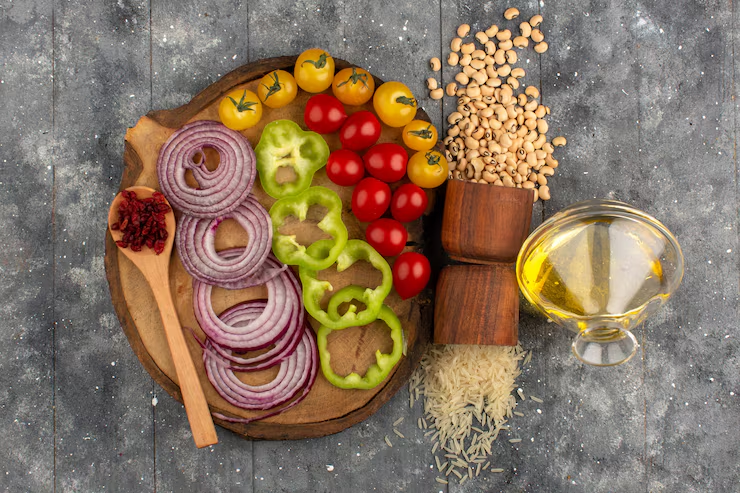
The gluten free Mediterranean diet goes beyond a simple meal plan—it’s a long-term commitment to health, vitality, and enjoyment. Rich in fresh vegetables, lean proteins, healthy fats, and naturally gluten-free grains, this lifestyle supports both physical wellness and emotional satisfaction.
Designed for those seeking a gut-friendly, anti-inflammatory way of eating, the gluten free Mediterranean diet offers numerous benefits. From reducing chronic inflammation to supporting heart health and better digestion, it blends traditional Mediterranean flavors with gluten-conscious choices. With mindful ingredient swaps and preparation, you won’t feel like you’re missing out.
Food isn’t just about nutrition—it’s about culture, community, and nourishment. Embracing the gluten free Mediterranean diet helps you reconnect with wholesome, satisfying meals that promote healing and longevity. Let your meals be both delicious and purposeful, making your health journey not only sustainable but deeply rewarding.
❓ FAQs
Q1. Is the Mediterranean diet naturally gluten-free ?
Traditional Mediterranean meals include whole wheat bread, bulgur, and couscous. However, by substituting these with gluten-free grains like quinoa or rice, you can easily follow a gluten free Mediterranean diet without losing its benefits.
Q2. Can I lose weight on a gluten free Mediterranean diet ?
The diet is rich in fiber and low in processed foods, which helps control appetite and stabilize blood sugar. Many people naturally shed excess weight, especially when combining it with an active lifestyle.
Q3. What should I avoid on a gluten free Mediterranean diet ?
Gluten-containing grains (wheat, barley, rye)
Processed gluten-free snacks (often high in sugar)
Sauces or dressings with hidden gluten
Stick to whole, naturally gluten-free foods.
Q4. Is the gluten free Mediterranean diet suitable for kids ?
It offers balanced nutrition with healthy fats, fruits, and vegetables. Just ensure they get enough calories and protein from legumes, lean meats, and gluten-free grains.
Q5. How do I eat out on a gluten free Mediterranean diet ?
Choose restaurants that offer:
Grilled fish or chicken
Salads with olive oil dressing


